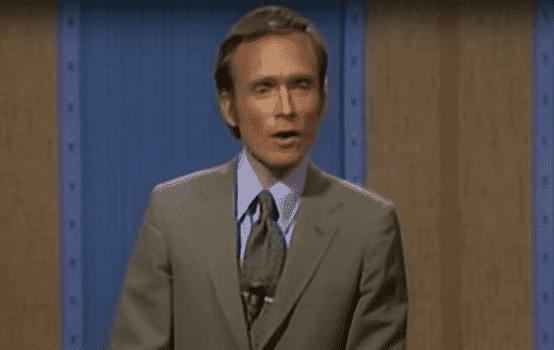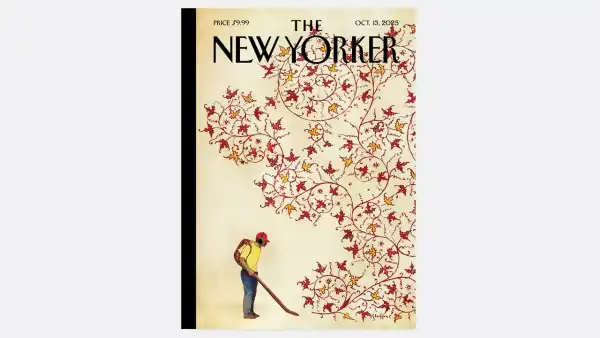
Once describing the appeal of his eponymous show in a 2011 appearance on Charlie Rose, Dick Cavett volunteered somewhat coyly that it was the nature of its conversations. Sure, there was the top-of-the-line talent: Orson Welles, Groucho Marx, Jack Benny, Lucille Ball, Bette Davis, Katharine Hepburn, Marlon Brando, Robert Mitchum, John Lennon, the list goes on nearly ad infinitum. But there was also something to these conversations, a certain substance that distinguished Cavett from a Merv Griffin, a Jack Paar, or a Johnny Carson (Cavett actually began his TV career writing jokes for the latter two before launching his own show on ABC in 1968).
Declining the shrewd analysis once given by a highbrowed European—that Cavett’s was the only intelligent late-night talk show of that golden age—Cavett’s own modesty obfuscates a very sound and true verdict. Of course, in hindsight, and in consideration of the sweeping cultural changes of the last half-century, what was once the bar for “intellectual”—Cavett uses the example of Jacques Barzun—has been lowered. Notwithstanding this, Cavett, a Yale man and anagram aficionado, had, if not the charm of Johnny Carson, then a sophisticated wit and talent for perspicacious talk that really has no modern equivalent.
Where Carson’s and Steve Allen’s personalities have been all but ingrained in the national consciousness, Cavett’s more understated and deadpanned demeanor lacked enduring vivacity. But his show also wasn’t intended as self-aggrandizing shtick; it was meant as a celebration-bordering-idolization of the man or woman seated in that night’s chair. Very roughly speaking, Cavett was something of a cross between Carson and William F. Buckley’s Firing Line, yet unique in the sense that he always brought out the best in his choice guest.
While Cavett’s niche was Hollywood, he did not hesitate to bring on politicians, intellectuals, writers, and esoteric personalities from all walks of life, combining bizarre though entertaining ensembles that always made for an immersive experience. Take, for example, Groucho Marx and Truman Capote, who were diametric opposites in just about every possible way, save for the fact that they were both writers (or thought of themselves as such). Groucho, being an eternal favorite of Cavett’s, owed the talk show host for, if not revitalizing, then at least sustaining his career and legacy—the two struck up a friendship that lasted until Groucho’s death in 1977. (It should be noted that, unlike today’s Millennial generation, Baby Boomers still clung to their cultural inheritance: the Marx Brothers films experienced a revival during the 1960s and 1970s.)
- Norman Mailer Was a Left-Conservative
- The American Mind is as Closed as Ever
Cavett, himself too old to be a Boomer but young enough to be the son of many of his guests, pigeonholed himself as a man of his time. His show’s title screen was adorned with variegated flower designs and colors recondite of the ’60s countercultural ethos. Though an unapologetic liberal, he regularly showered his guests with patrimonial veneration, not as one might praise a trashy celebrity today, but as a show of respect for the genuine talent before him.
This point was exhibited with Groucho Marx, who was a guest on the show a half a dozen times during the mid-1970s. Groucho, who was born in 1890, was by the late 1960s somewhat out of step with the radically changing mores of the time. Cavett took Groucho’s performance in stride, however, allowing him a full hour on one program in 1969, despite his being originally slotted for only half an hour. Cavett plugged this interview in a promotional to the show many years later as “the last edge of Groucho’s prime.” Hailed as an “American institution” by then, Groucho appeared from behind a moving set piece to the music of “Hooray for Captain Spaulding” in an almost absurdly over-the-top entrance that was quintessential of his character. Against a lighted façade imaging a scene from a Marx Brothers film, he caroled into “Hello, I Must Be Going,” miming the operatic mock grand entry for the Captain Spaulding character he made famous in Animal Crackers. One can only imagine how remarkable that must have been to witness in person, to see him on full display, in charge and in control, dancing about the stage, making wisecracks, breaking into song.
Another of Cavett’s memorable conversations was with Orson Welles, who, like Groucho, cut a larger-than-life figure both on screen and in person. Welles, a fabled storyteller, regaled his audience that night with tales of Harry Cohn, that old, sinister Hollywood mogul of the studio era, whom Welles regarded with equal parts disdain and admiration. He chronicled his old radio days working under Cohn when the Columbia Pictures studio executive bugged his office, creating an opportunity for some fun. At the start of each day, Welles would mimic his Mercury Theatre radio voice and say “Good morning everybody this is Mercury productions beginning another day’s work, we hope you’ll enjoy.” Continuing the gag, he would then finish his days with “well that winds up another day at the Mercury, tune in tomorrow!” Each line, said Welles, was accompanied by the full Mercury Theatre orchestration, likely enraging an already irascible Cohn. Welles, like Groucho, was a force of nature, a dramatic figure with the uncanny talent of making intriguing even the most banal characters and situations. That is what makes the Cohn story enchanting even all these years later, and what continues his legacy over three decades after his death. It is unsurprising that when asked by Charlie Rose who he would dine with if given the choice of any guest who appeared on his show, Dick Cavett declared without hesitation: Orson Welles.
My personal favorite story of Welles’ was of his confrontation with Ernest Hemingway just as he was becoming a major star in the late 1930s. Hemingway, in his almost caricatured masculine persona, snarled at the “damn faggot who runs an art theater,” prompting the quick-witted Welles to respond with a lisp, “Oh, Mr. Hemingway, you think because you’re so big and strong and have hair on your chest that you can bully me.” All the accounts from both sides describe a few swings following this exchange, and Welles later fashioned the episode as though he’d triggered the Spanish Civil War (Hemingway and Welles were both bullfighting enthusiasts). The two towering matadors soared up and, standing nearly a combined 15 feet and weighing in at 500 pounds, began to take vicious swipes at one another in a duel for the ages. Whatever really happened, Welles and Hemingway eventually became comrades. (I must confess that this story was told on Parkinson, not Cavett, but it was too good to pass up, and what better way to honor a legend than to make use of one of his favorite literary devices, embellishment?)
Back to Cavett, he had his fair share of fights over the course of his three-odd decades on television. In interviews, he especially enjoys speaking of the famed Marlon Brando-Ron Galella spat. After Cavett’s show had ended, Dick and Marlon decided to go to a restaurant in Chinatown for dinner. This was the heyday of Ron Galella, the “paparazzo extraordinaire,” whose antics occasioned a restraining order from none other than Jacqueline Kennedy Onassis. On this night, however, Brando was Gallela’s prey. The photographer started to harass the famous actor with his usual routine, causing Brando, who was in no mood for nonsense, to “sucker punch” Galella in the jaw, sending him to the hospital with five fewer teeth (Brando, too, was hospitalized with a bloated hand, which Cavett described in later interviews).
Another famous oratorical prizefight, this time on-air during Cavett’s show, featured two of America’s most famous postwar writers: Gore Vidal and Norman Mailer, who at the time loathed each other. They appeared alongside Janet Flanner, who was known for writing the New Yorker’s “Letter from Paris” (she was also a noted friend of Ernest Hemingway’s). The ever-combative and jealous Mailer, with his machismo façade, began touting his oversized intellect to the audience, prompting Cavett to go on the defensive. Flanner chimed in with her sharp-witted rejoinders, triggering what might be the cleverest, most unscripted retort ever uttered on any talk show:
Flanner: (to Mailer and Vidal) It’s very odd that you act so—you act as if you were the only people here.
Mailer: Aren’t we?
Flanner: They’re here, he’s here, I’m here…and I’m growing very, very bored. [Throws kiss to Mailer with her white-gloved hand, getting big laugh.]
Mailer: You still haven’t told me whether you’re Gore’s manager or the referee.
Cavett: If you make history here by punching a lady… [laughter]
Flanner: I won’t have it! I won’t have it!
Mailer: Now, look, you see the sort of thing that goes on. Now you say I make history by punching a lady. You know perfectly well…you know perfectly well that I’m the gentlest of the four people here. [laughter]
Cavett: I just hope it lasts through the next whatever we have left.
Mailer: I guarantee you I wouldn’t hit any of the people here, because they’re smaller.
Cavett: In what ways smaller?
Mailer: Intellectually smaller.
Cavett: Let me turn my chair and join these people. Perhaps you’d like two more chairs to contain your giant intellect. [applause]
Mailer: I’ll take the two chairs if you will all accept finger bowls. [Mailer later wrote about this moment: “This remark was sufficiently gnomic for Cavett to chew and get to no witty place.”]
Cavett [mystified]: Who wants to grab this on our team? [pause] I nearly have it. It means something to me. Finger bowls. Things you dip your fingers in after you’ve gotten them filthy from eating. Am I on the right track? Am I warm?
Mailer: Why don’t you look at your question sheet and ask a question?
Cavett: Why don’t you fold it five ways and put it where the moon don’t shine.
To add some context, before the show had even begun, Mailer, apparently under the influence of alcohol, nearly came to blows with Vidal. He was in a fighting mood that night. And Vidal, though cool to the point of aloofness before the Mailer volcano, did little to ease the forthcoming conflict, actually coaxing on his counterpart by not-so-subtly referencing the time Mailer stabbed his wife. Outraged, Mailer dared Vidal to be more forthright: “We all know that I stabbed my wife years ago, we do know that, Gore. You were playing on that.”
Mailer’s disorderly personal life had also recently been the subject of a TIME article in which he was effectively made into a Neanderthal and volatile sadomasochist, a far cry from the luminous writer of The Naked and the Dead. Mailer, who depended on a healthy and continually stoked ego, was already feeling deflated; Vidal’s provocations, whether or not they were warranted, were merely salt on the wound. However, unlike some other infamous fights involving these men (see Buckley and Vidal), Mailer and Vidal would in due time bury the hatchet: the two even grew to respect one another in old age. But on that unforgettable night in 1971, Cavett arguably described it best when he rendered this retrospective appraisal: “I think we all agreed without ever saying so that of our little quartet of alleged luminaries, Janet Flanner came off best.”
I’m fully aware that in trying to encapsulate what made Dick Cavett’s show so great, I have done a disservice by ignoring so many pivotal moments. Who can forget the time, to name but one example, when Salvador Dalí dropped an armadillo right into the host’s lap? Or when Katharine Hepburn, a deeply private individual, chose to do the whole interview during what was supposed to be a trial run, which resulted in one of the greatest discussions in television history? How about when Alfred Hitchcock lumbered in to the tune of Gounod’s Funeral March of a Marionette, parodying the famous silhouetted introduction of his anthology series? Droll and sagacious, Hitchcock proved to be as entertaining as his masterpiece films. There was also George Harrison, who famously jumped out of his chair after being told by his host that Yoko Ono had sat there just a few weeks earlier. Another unforgettable moment was when the deeply private Robert Mitchum showed himself on Cavett to be intelligent and introspective with an exorbitant vocabulary, describing his “peregrinations” from here to there.
These and so many other moments (I can’t forget about the health enthusiast who actually died on the show’s couch) were what made Dick Cavett’s show so special. But these were only moments, moments conceived out of the larger-than-life personalities they highlighted. Indeed, Cavett’s show succeeded—flourished even—because, as the host put it, it was done during a time when legends still walked among men. Americans still had an aptitude for prolonged conversations, insightful, substantive, witty, funny but not vulgar, political but not ideological, rather than the intellectual vacuity that passes on the talk show circuit today. Cavett was no Johnny Carson: his persona will be forgotten to the recesses of time. But the moments he created will endure. And for that reason, a part of Dick Cavett will, too.
Paul Ingrassia is a co-host of the Right on Point podcast, a former White House intern, and a freelance contributor to National Review Online.
Sourse: theamericanconservative.com






